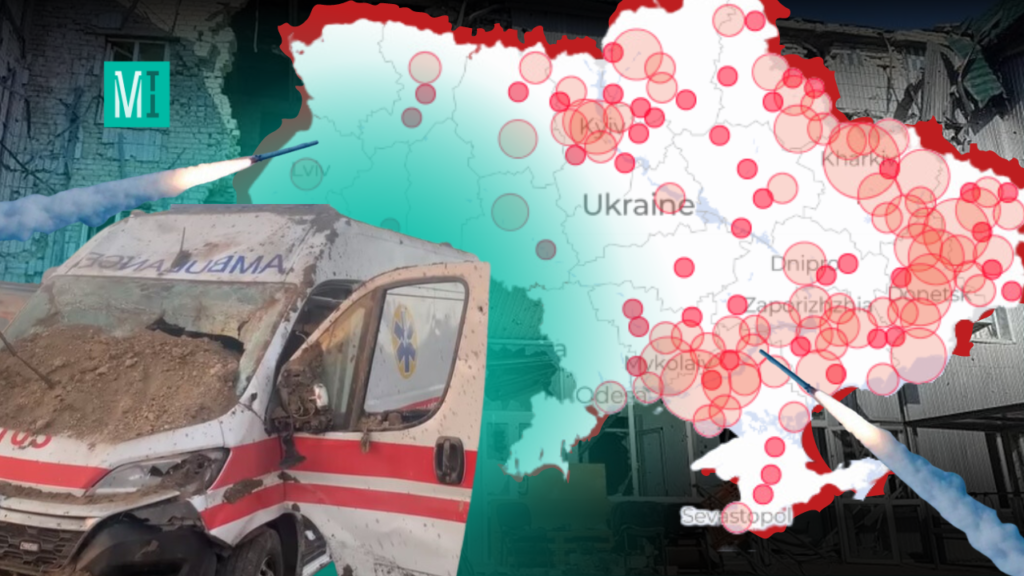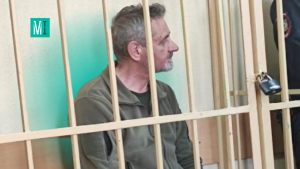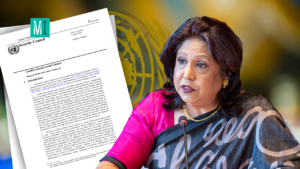A Horrific Milestone: More Than 1,000 Attacks on Health Care in Ukraine Since Russia’s Full-scale Invasion

1014 attacks have been perpetrated against Ukraine’s hospitals, health workers, and other medical infrastructure since February 2022.
Today Ukraine marks the grim milestone of more than 1,000 attacks on health care workers and infrastructure since Russia’s full-scale invasion began 17 months ago, according to documentation and monitoring by human rights and humanitarian organizations. So far, an estimated 148 health workers have been killed in these attacks and 414 attacks on hospitals and clinics partially or completely destroyed the facilities, the groups said.
This equates to approximately two attacks per day on health care facilities, workers, and other medical infrastructure since the first day of the full-scale invasion on February 24, 2022. These staggering statistics illustrate the devastating and far-reaching impact of both deliberate and indiscriminate attacks on Ukraine’s health care system.
In one example, a hospital in a frontline town in Donetsk Oblast has been repeatedly shelled since the onset of the invasion, with the latest attack perpetrated in June 2023. An administrative worker at the hospital told researchers:
“The missile was aimed at destroying our surgical department. There were no military [troops] there… The entire infrastructure in the city was destroyed, there are no schools, no kindergartens. We had a hospital, and it had to be destroyed [by Russian forces] as well. The maternity ward was the first to be hit.”
“When our accounting department and the blood transfusion center caught fire, [Russian forces] started hitting that area on purpose,” said the hospital staffer. “[They] burned down.”
The findings come from a coalition of global and Ukrainian organizations, including eyeWitness to Atrocities, Insecurity Insight, the Media Initiative for Human Rights, Physicians for Human Rights, and the Ukrainian Healthcare Center. The organizations have been monitoring and documenting attacks on Ukraine’s health care system since the onset of the full-scale invasion, including in a landmark February 2023 report, which highlights the staggering toll of Russia’s war of aggression. Based on an analysis of specific attacks, the report concluded that there is a reasonable basis to believe that attacks on Ukraine’s health care system constitute war crimes and potentially crimes against humanity as well.
This dataset uses the definitions of attacks on health care as defined by the World Health Organization and used by the Safeguarding Health in Conflict Coalition.
As of July 14, the monitoring organizations report:
- 1014 total attacks on health care
- 414 attacks damaged or destroyed hospitals
- 79 ambulances attacked
- 148 health workers killed
- 106 health workers injured
- 57 attacks affecting children’s hospitals
- 40 attacks affecting maternal health facilities
“These deliberate and indiscriminate attacks on Ukraine’s health system show how Russian forces use these vicious, illegal tactics to control, coerce, and punish civilians,” said Christian De Vos, JD, PhD, PHR’s director of research and investigations.
“We call on the International Criminal Court as well as other international and domestic prosecutors to urgently prioritize the investigation of attacks on health facilities as both war crimes and crimes against humanity,” said De Vos.
“Russia is also obligated to make reparations, including payment for reconstruction and rehabilitation, for its breaches of international law, and compensate the Ukrainian state and individual Ukrainians for loss of life and injury. International actors should hold Russia to account in this process,” said Uliana Poltavets, Ukraine emergency response coordinator at PHR.
“For nearly 1.5 years, we have been witnessing the escalation of attacks on healthcare in Ukraine, reaching a terrifying milestone of over 1,000 incidents since the onset of Russia’s full-scale invasion,” said Diana Rusnak, analyst at Ukrainian Healthcare Center. “These acts are not collateral damage, but a calculated means of warfare approved by Russia’s higher political and military leadership. The consequences are profound, causing not only immediate devastation but also impairing the capacity to provide life-saving care for people. Unless accountability prevails, these crimes will persist unabated.”
The data on attacks on health care in Ukraine reflect several emerging patterns of devastating violence against Ukraine’s health care system.
The destruction of medical infrastructure, in addition to being a violation of the laws of war, reduces community members’ access to life-saving health care. When hospitals and medical facilities are known to be targets of attack, patients may not seek necessary care, subjecting themselves to greater risk of health complications. Women and girls, particularly, can face a lack of gynecological and reproductive medical care when health choices are increasingly driven by scarcity, safety, and conflict.
Attacks on health care can also deter survivors of sexual and gender-based violence from coming forward and seeking necessary care. A lack of access to care, combined with other diminished social support and fear of reprisals or stigma, can lead to other forms of interrelated violence in the long term, including denial of reproductive and bodily autonomy, unwanted pregnancies, forced pregnancies, infertility, mental health harm, and barriers to preventative care and other essential reproductive health services.
“I have been analyzing attacks on health care for many years. These figures are truly staggering,” said Christina Wille, director of Insecurity Insight. “At this grim milestone we should reflect on the horrific consequences of such attacks in Ukraine and in many other countries and territories around the globe, such as Myanmar, Sudan and the occupied Palestinian territory where health facilities and workers continue to suffer dire levels of violence. We hope that this marks an inflection point to galvanize concerted action to protect health care globally and bring an end to these tragic attacks.”
“The data regarding attacks on health care in Ukraine urgently warrants further investigation by prosecutors, and provides strong evidence upon which to pursue accountability for these devastating attacks,” said Carrie Bowker, director at eyeWitness to Atrocities.
“Ukraine’s health care system is severely affected by Russia’s attacks,” said Lyubov Smachylo, an analyst at the Media Initiative for Human Rights. “Health workers and other staff are affected by attacks on hospitals and during ambulance responses. Combat medics are the target of the Russian army on the battlefield; many of them are also held captive in Russian places of detention as prisoners of war, where they are beaten and tortured. These actions are a blatant violation of international humanitarian law and are occurring regularly. It’s important that those responsible for these crimes are held accountable to prevent future violations.”
The administrative worker at the attacked Donetsk hospital told researchers of the facility staff’s resolve in the face of continuing attacks.
“When we were under fire, there was such panic that we were being butchered here for three days,” they said. “And [when] we met with the management… the director asked us: “What are we going to do [next]?” “Well, work, [we said].”
Physicians for Human Rights (PHR) and partners continue to call for an end to these illegal attacks on Ukraine’s health care system and for the Russian Federation to be held accountable for its violations of international law. PHR also continues to call for enforcement of UN Security Council Resolution 2286, which protects health care in conflict.







